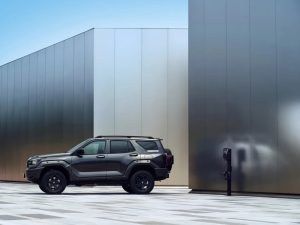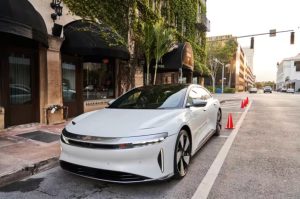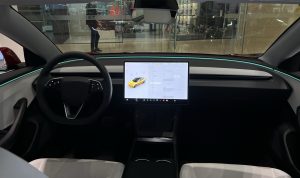Xiaomi has reportedly obtained the qualification to manufacture cars, and its Beijing factory is actively recruiting to accelerate mass production.
5 min read
Lei Jun personally attended road tests in Xinjiang.
Xiaomi is reported to have obtained the qualification to manufacture cars!
According to Reuters, Xiaomi has received approval from China’s National Development and Reform Commission to produce electric vehicles.
Recently, more information about Xiaomi’s car project has been revealed.
Lei Jun and several executives gathered in Xinjiang, and some netizens have even spotted Xiaomi’s car undergoing road tests. Details about energy consumption and information from Xiaomi’s official car website have also been exposed.
Obtaining the “qualification certificate” indicates that Xiaomi’s car project is drawing closer, and they are just a hundred meters away from mass production.
Xiaomi’s Qualification for Car Manufacturing Revealed
According to Reuters, the National Development and Reform Commission approved Xiaomi’s production of electric vehicles earlier this month, making Xiaomi the fourth carmaker to receive such approval from the Commission since late 2017.

If the news is accurate, then Xiaomi’s car project is just one step away from going public: obtaining approval from the Ministry of Industry and Information Technology (MIIT).
As is well known, for new energy vehicles to be produced and sold, they need approvals from both the National Development and Reform Commission (NDRC) and the MIIT, which is referred to as the “dual qualifications.”
If Xiaomi has already obtained approval from the NDRC, the next step would be to await news from the MIIT.
Moreover, there were previous reports indicating that Xiaomi’s car factory in Beijing’s Yizhuang district has completed its first phase of construction, with an estimated production capacity of 150,000 vehicles.

According to Reuters’ report, Xiaomi has already completed the construction of a facility for a 200,000-unit electric vehicle factory in Beijing.
Insiders have indicated that Xiaomi plans to produce around 100,000 vehicles next year. Since last week, Xiaomi has accelerated the hiring process for its factory, with plans to increase production capacity in December.
Sina Technology recently learned that Xiaomi’s car factory has started recruiting workers, including those for painting operations, battery workshop operations, and other roles, with a shortage of over 100 workers.
These various reports suggest that Xiaomi’s car project is entering the production phase.
Recent frequent exposures also indicate that Xiaomi’s car is getting closer to going public.
Lei Jun’s Personal Road Test in Xinjiang and Disclosure of Energy Consumption Information
First, a user on Xiaohongshu (Little Red Book) claimed to have encountered Xiaomi’s car during road testing in Xinjiang.

△ Equipped with LiDAR
He encountered four Xiaomi cars on the urban expressway from Urumqi to Changji.
According to the information he provided, the car model has yellow brake calipers, and the “interior center console has sharp edges.”
From the pictures he posted, it’s evident that there are versions of the car with LiDAR (Light Detection and Ranging) and versions without LiDAR.

△ No LiDAR, Image Source: Weibo @佳伟老板
On the second day of this post, the IP address of Lei Jun’s Weibo post indicated that he was in Xinjiang.
Also present in Xinjiang was Xiaomi’s co-founder Lu Weibing.
Connecting these exposures, it’s safe to assume that Xiaomi’s car is undergoing summer testing in Xinjiang, and top executives including Lei Jun are present on-site.
Subsequently, Hu Zhengnan, a partner at Shunwei Capital, an investment firm founded by Lei Jun, posted on Weibo, likely revealing information about Xiaomi’s car energy consumption.
According to his post, the electric car had a remaining range of 152 km, with 4 people on board, an ambient temperature of 37 degrees Celsius, and after actually driving 85 km, the displayed remaining range was still 90 km, resulting in an energy consumption of 8.8 kWh.
Moreover, there were multiple instances of acceleration during the journey. Hu Zhengnan also added that the route included highways, national roads, and rural roads, with both uphill and downhill sections.
△ Image Source: Weibo @胡峥楠
Based on the images he shared, the typical energy consumption of this car model is 14.2 kWh/100 km. If we combine this with the previously exposed 101 kWh battery pack for Xiaomi’s car, the first model’s range is expected to exceed 700 km.
Additionally, Xiaomi’s car official website is also in preparation.
According to the Ministry of Industry and Information Technology’s ICP/IP Address/Domain Name Information Filing Management System, Xiaomi’s car has registered the domain name xiaomiev.com this month, which is likely to be the official website for Xiaomi’s car in the future.

Xiaomi’s progress in the field of electric vehicles is steadily advancing.
Summary of Information Revealed About Xiaomi’s First Car
Firstly, Xiaomi’s debut car is positioned as a mid-size electric coupe, featuring a sleek design.

The all-electric model will utilize an 800V platform, paired with a 101 kWh ternary lithium battery, offering a starting range of 700 km. This marks Xiaomi’s first competitive advantage: a high-voltage platform with an extended range.
Information about the intelligent cockpit is relatively limited at present, but it is confirmed to feature a horizontally suspended central touchscreen. While voice interaction details haven’t been disclosed, it’s highly likely to incorporate an in-car version of Xiaomi’s AI assistant, “Xiao Ai.” The chipset hardware is also likely to be Qualcomm’s Snapdragon flagship cockpit chip.
Regarding intelligent driving capabilities, Xiaomi’s car will be available in two versions: one with a LiDAR sensor and another without. The LiDAR-equipped version will enable intelligent driving across three domains: urban, highway, and parking.

In terms of the most crucial aspect, which is pricing, Lei Jun has explicitly mentioned that the price of Xiaomi’s first car will be between 100,000 to 300,000 yuan (approximately $15,500 to $46,500). This means that their first vehicle, equipped with an 800V platform, extended range, and advanced intelligent driving with LiDAR, will still be priced under 300,000 yuan.
With the news of production qualification being granted, if it holds true, the most sensitive part for Xiaomi’s car has been secured. Following this, Xiaomi’s official promotional efforts will likely kick off, and we can expect to see more detailed information about Xiaomi’s car.
Lei Jun seems to be aiming for an ambitious high-end vision, while also maintaining Xiaomi’s reputation for offering value-for-money products. Which path would you prefer: Xiaomi pursuing a high-end strategy or continuing its affordable and value-driven approach?





